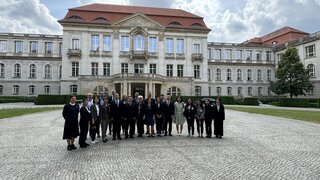About the Sino-German Energy Partnership
As part of Germany’ key instrument for international cooperation on climate and energy policy issues, the Sino-German Energy Partnership is the official platform for institutionalised energy dialogue between China and Germany. It links three levels of action: high-level policy dialogue; business-to-government exchange and an sharing of experiences on technical and regulatory solutions that promote the energy transition.

The objective
The main objective of the partnership is to foster and advance the energy transition of both countries through constant political, economic, regulatory, and technological exchange. In a collaborative approach, it further drives decarbonization in China, improves the market conditions for decarbonizing the globally integrated value chains, and strengthens the energy supply in both countries.
Political steering and structure
For China, the National Development and Reform Commission (NDRC) and the National Energy Administration (NEA) oversee the partnership, while the Federal Ministry for Economic Affairs and Climate Action (BMWK) takes the lead on behalf of Germany.
Two thematic working groups have been established under bilateral agreements to facilitate cooperation as well as intensify the exchange of information, experiences and best practices. On the Chinese side, the working group on “energy” is led by NEA, while the working group on “energy efficiency” is headed by NDRC.
Our thematic focuses
Working Group on Energy

- Power market
- Power sector flexibility
- Decentralised renewable energy incl. Agri-PV and biomethane
- Sustainable heating
- PtX incl. green hydrogen
Working Group on Energy Efficiency

- Energy efficiency in industry
- Energy efficiency in cities
- Energy efficiency networks
- Innovative business and finance model
What we do
The Deutsche Gesellschaft für Internationale Zusammenarbeit (GIZ) GmbH was commissioned by the BMWK with the implementation of the bilateral energy partnership with China. A secretariat with full-time advisors in Berlin and Beijing serves as a point of contact and coordination for its activities.



